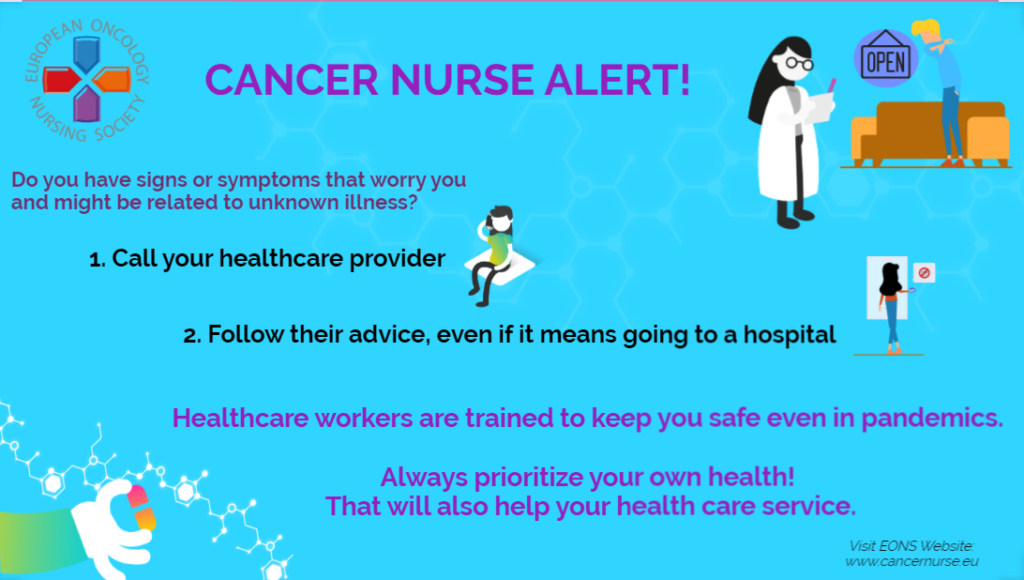The Covid/Cancer Timebomb – Cancer Nurses Speak out

Fear of COVID-19 is delaying cancer diagnosis and care, putting lives in danger and risking unsustainable further pressure on healthcare services.
As millions of Europeans come to terms with the unplanned for reality of the viral pandemic that COVID-19 is wreaking on our populations and economies, we are seeing healthcare systems coping in different ways across the continent. There is no doubt that for nigh on 4 million cancer patients in Europe, the pandemic poses a whole new set of challenges and concerns for their treatment. “The pandemic is transforming cancer care in real time, with implications for patients, healthcare workers, policy makers and all sectors of the healthcare industry,” says EONS President Andreas Charalambous. Some countries, such as Cyprus and the UK, are able to treat cancer patients in cancer centres away from designated hospitals where COVID patients are being treated, or in separate pathways of the same hospital. Outpatient consultations for many have gone online in order to protect immunosuppressed patients from infections environments. “Telemedicine & E-health tools could provide us with a safe way to continue some patient consultations” confirmed Johan de Munter, EONS President-Elect and Hematology Nurse Consultant from Gent University Hospital, Belgium “but means of communication cannot replace all face to face consultations where crucial observations and psychosocial support need to be provided for our patients” he concluded.
There can be no doubt that many hospitals across Europe are facing challenges with staffing shortages, providing enough personal protective equipment and managing the higher number of patients possibly than ever before. However, our cancer nursing community is becoming increasingly worried about a new trend: less people with suspected cancer are contacting healthcare providers and fewer patients with ongoing cancer treatment seek acute care for complications and side-effects. A senior UK cancer nurse working on the front line stated that “I cannot believe the amount of people we are already seeing with new cancers that should have presented a while ago”. His colleague from Sweden, Helena Ullgren, concurs as she and her fellow cancer nurses “are wondering where all the oncology patients are, most people in oncology now only call with COVID symptoms.” Despite the more flexible lockdown in Sweden, EONS Past-President and Head of the Gotland Cancer Centre, Lena Sharp, reports “We’ve seena substantial drop in cancer patient diagnosis over the last month which is completely abnormal and indicates that people are staying at home rather than seeking medical advice. Decisions which may increase the cancer burden and, in the worst case scenario, cost them their lives.” We see similar patterns in other countries and for other groups, even for patients with acute coronary symptoms.
Time is of the essence in cancer care, in so many ways. While there can be no doubt that COVID-19 has severely disrupted many treatments or prolonged waiting times, anyone who suspects they may have cancer of any kind should not be delaying contacting the relevant healthcare providers. People with ongoing or recently completed cancer treatment should contact their nurse or physician immediately if any signs or symptoms of serious complications occur. Early detection and close monitoring of side effects during and after cancer treatment are key elements for optimal outcomes and the COVID-19 pandemic does not stop cancer from spreading. Delays in diagnosis create a ticking time bomb for already over stretched healthcare services and patients’ health. “Anyone with existing or suspected cancer should not be afraid to contact their healthcare provider for treatment or diagnosis. Trust your healthcare workers to do everything they can to make the right decisions to keep you safe. Do yourself and your healthcare system a favour by preventing the higher personal and economic costs of delaying treatment” concludes EONS Board Member Wendy Oldenmenger, a cancer nurse from the Netherlands who has recently returned to clinical practice from academia in order to support the increased demands of the pandemic.